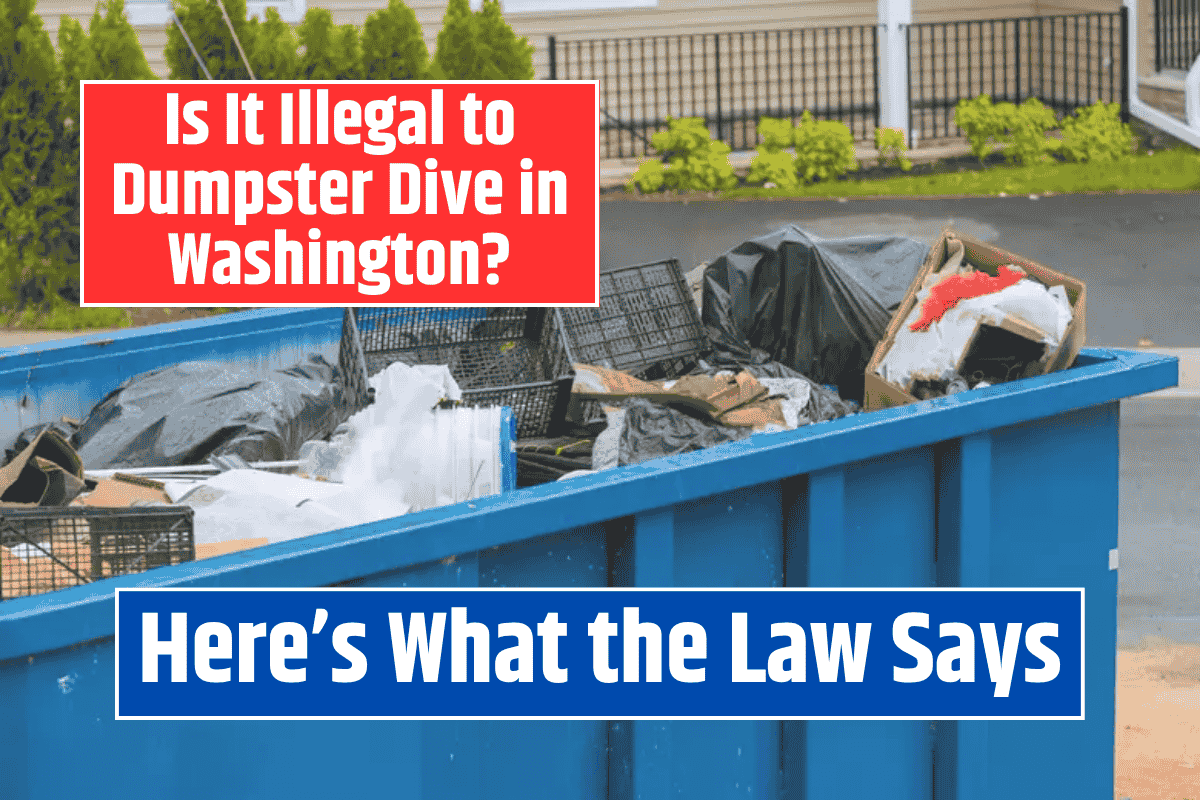Dumpster diving has become a common activity for people who want to save money, reduce waste, or find reusable items. In Washington state, many people are curious whether this practice is allowed by law.
While you can find valuable things in dumpsters—like furniture, electronics, and even food—you must also be careful not to break any laws.
In this article, we explain whether dumpster diving is legal in Washington, what the law says, the risks involved, and how you can stay out of trouble while doing it.
What is Dumpster Diving?
Dumpster diving means searching through trash bins or dumpsters to find things that others have thrown away but are still useful. People may dumpster dive for different reasons: to save money, avoid waste, recycle items, or even protest against consumerism.
Some people follow a lifestyle called freeganism, which encourages using discarded items to reduce environmental impact.
Is Dumpster Diving Legal in Washington?
The simple answer is yes—dumpster diving is not illegal in Washington state. There is no state law that bans people from taking items from open and accessible dumpsters on public land. If a bin is placed outside on a public sidewalk and not locked, it’s usually okay to check inside.
However, the legality depends on how and where you do it. Let’s look at the important points to keep in mind.
Legal Boundaries You Should Respect
1. Trespassing is Illegal
Dumpster diving becomes illegal if you enter private property without permission. Many dumpsters are placed behind stores, inside fenced areas, or near businesses. Even if the dumpster is visible, stepping onto private land can lead to a trespassing charge.
Washington state law clearly states that trespassing is a crime, and you can be fined or arrested for it.
2. Check Local City and County Rules
While the state doesn’t ban dumpster diving, cities and counties in Washington may have their own rules. For example, some areas may not allow scavenging or consider it a public nuisance. Local laws may also include anti-loitering or anti-salvaging rules. So it’s important to check the regulations where you live or plan to dive.
3. Respect Business Signs and Locks
If you see signs like “Private Property” or “No Trespassing”, or if the dumpster is locked or fenced off, you must stay away. Trying to force it open or climb over a fence is illegal and could lead to additional charges such as property damage or unauthorized entry.
4. Avoid Making a Mess
Even if dumpster diving is allowed in your area, you could still get in trouble for littering, illegal dumping, or disturbing the peace. If you leave trash behind or make a mess while searching through the bin, the property owner or a passerby may report you.
5. Don’t Take Personal or Sensitive Information
If you find documents that have someone’s personal information, like credit card details or identification, taking them can result in identity theft charges, which are serious criminal offenses in Washington and across the U.S.
Is Dumpster Diving at Night Legal in Washington?
Yes, dumpster diving at night is not against the law, but it can raise suspicion. People may feel unsafe if they see someone going through trash late at night. That’s why it’s best to avoid quiet or high-security areas after dark and to carry an ID just in case you’re questioned by law enforcement.
How to Dumpster Dive Legally in Washington
Here are a few tips to stay safe and legal:
Only dive in publicly accessible areas.
Never climb fences or enter private property.
Avoid locked bins or areas with warning signs.
Check local rules with your city or county.
Leave the place clean and put everything back neatly.
Don’t disturb people, businesses, or passersby.
Following these basic steps will help you avoid legal issues and make the most of dumpster diving in Washington.
What If You Get Caught Dumpster Diving?
If you are caught dumpster diving:
On public land, you may just be asked to leave.
On private property, you could face fines or arrest for trespassing.
If you’re causing a disturbance, you could be charged with disorderly conduct or littering.
But in most cases, if you’re respectful, clean, and cooperative, law enforcement may let you go with just a warning.
Dumpster diving is generally legal in Washington state, but that doesn’t mean you can dive just anywhere. You must follow laws related to trespassing, property rights, and local city rules. If you’re careful, respectful, and follow basic safety steps, dumpster diving can be a smart way to reduce waste and even save money.
So before you start digging through a bin, just ask yourself: Is it in a public place? Is it unlocked? Am I allowed to be here? If the answer is yes, you’re probably good to go.
[1] https://www.theenvironmentalblog.org/2025/04/is-dumpster-diving-legal/
[2] https://www.reddit.com/r/DumpsterDiving/comments/2h9n3d/anyone_here_in_washington_state/
[3] https://katsfm.com/washington-dumpster-diving-tips/












